
So, you've found yourself in the position of needing to craft the perfect diet for your emu. No worries, we've got you covered.
In this comprehensive guide, we will explore the essential nutrients for emus, the best protein sources to include in their diets, the role of carbohydrates in providing energy, the importance of fats and oils for their overall health, and special considerations for breeding emus.
But that's not all! We will also dive into feeding emu chicks, recommended supplements for optimal emu health, and share some tips and tricks to help you balance their diet.
Get ready to take your emu's nutrition to the next level!
Understanding Emu Nutritional Requirements
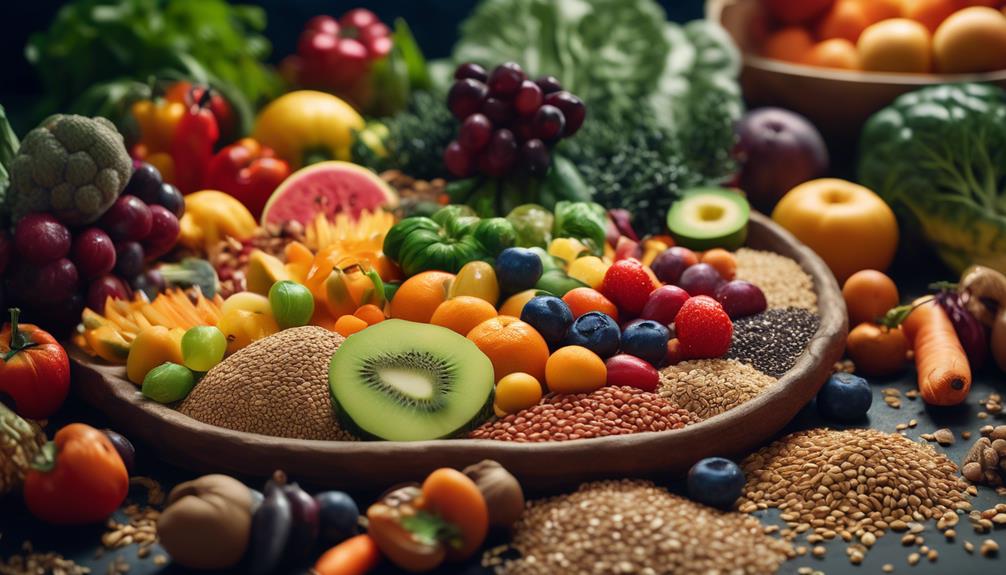
Do you know what nutritional requirements are essential for keeping your emu healthy and thriving? Understanding the basics of emu nutritional needs is crucial for ensuring the well-being of these magnificent creatures. Emus have specific dietary requirements that must be met in order to maintain optimal health. By customizing their diet to suit their individual needs, you can help them thrive.
Emus are herbivorous birds, meaning they primarily consume plant matter. Their diet consists of grasses, leaves, fruits, seeds, and even small insects. However, it's important to note that not all vegetation is suitable for emus. Some plants can be toxic and harmful to them, so it's crucial to research and select the right plants for their diet.
To ensure that your emu receives the necessary nutrients, their diet should include a variety of food sources. This will help provide them with a balanced combination of vitamins, minerals, and proteins. Emus also require a sufficient intake of water to stay hydrated, especially during hot weather.
It is recommended to consult with an avian veterinarian or an experienced emu breeder to determine the specific nutritional needs of your emu. They can provide guidance on tailoring the diet to meet the individual requirements of your emu, taking into account factors such as age, activity level, and overall health.
Understanding emu nutritional needs and customizing their diet accordingly is the key to maintaining their health and well-being. By providing them with a carefully balanced diet, you can help your emu thrive and lead a happy, healthy life.
Essential Nutrients for Emus
Emus require a balanced combination of essential nutrients to support their overall health and well-being. Understanding emu digestion plays a crucial role in crafting the perfect diet for these unique birds. Here are some essential nutrients that are vital for emus' diet and gut health:
- Proteins: Emus need a good source of protein for muscle development and growth. Include lean meats, fish, and insects in their diet to meet their protein requirements.
- Carbohydrates: Provide emus with complex carbohydrates like whole grains, fruits, and vegetables. These are essential for energy production and maintaining a healthy digestive system.
- Fats: Emus require a moderate amount of healthy fats from sources like nuts, seeds, and oils. Fats help with nutrient absorption and provide essential fatty acids for overall health.
- Vitamins and Minerals: Include a variety of fruits and vegetables in their diet to ensure they receive a wide range of vitamins and minerals. This will support their immune system and promote overall well-being.
Protein Sources for Emu Diets

When considering the protein sources for an emu's diet, it's important to choose options that provide optimal muscle development and growth. Emus are unique creatures with specific dietary needs, and meeting their protein requirements is crucial for their overall health and well-being. While traditional protein sources like meat and fish can be included, there are also alternative protein sources that can be incorporated into their diet.
One alternative protein source for emus is legumes. Legumes such as lentils, chickpeas, and beans are rich in protein and can provide a balanced amino acid profile. These plant-based proteins can be included in the emu's diet to ensure they're getting the necessary nutrients for muscle development.
Another alternative protein source for emus is insects. Insects are a natural part of an emu's diet in the wild, and they're an excellent source of protein. Mealworms, crickets, and black soldier fly larvae are commonly used as alternative protein sources for emus. These insects aren't only high in protein but also contain essential fatty acids that are vital for the emu's overall health.
Carbohydrates: The Energy Source for Emus
Carbohydrates serve as the primary source of energy for emus, providing them with the fuel needed for their daily activities and bodily functions. Just like humans, emus require a balanced diet that includes carbohydrates to maintain their health and vitality.
Here are some key points about carbohydrates in an emu's diet:
- Carbohydrate sources for emu diets: Emus can obtain carbohydrates from various sources, including grains, such as corn and barley, as well as fruits and vegetables like apples and carrots. These sources provide a mix of complex and simple carbohydrates, offering a steady release of energy throughout the day.
- Recommended carbohydrate intake for emus: Emus should consume carbohydrates as part of a well-rounded diet. A general guideline is to provide them with approximately 40-50% of their daily caloric intake from carbohydrates. This ensures they receive enough energy to meet their physiological needs.
- Energy balance: Carbohydrates are essential for maintaining an optimal energy balance in emus. They provide the necessary fuel for emus to engage in activities like foraging, walking, and even running. Emus rely on carbohydrates to support their high-energy lifestyle.
- Moderation is key: While carbohydrates are a vital energy source for emus, it's important to provide them in moderation. Excessive carbohydrate intake can lead to weight gain and potential health issues. Therefore, it's crucial to offer a balanced diet that includes carbohydrates along with other essential nutrients.
Fats and Oils: Supporting Emu Health
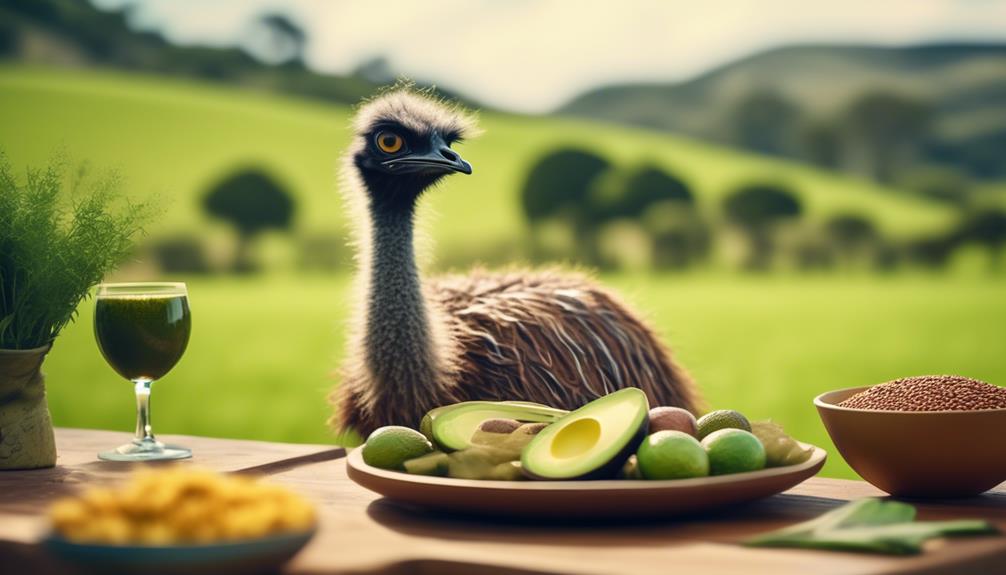
To maintain optimal health and vitality, it's important to consider the role of fats and oils in an emu's diet. While carbohydrates provide energy, fats and oils play a crucial role in supporting various bodily functions and promoting overall health. Emus have a unique digestive system that allows them to efficiently process and utilize fats.
When selecting fats and oils for your emu, it's essential to choose the right types that provide the necessary nutrients without causing harm. Emus require a balance of saturated, monounsaturated, and polyunsaturated fats. Saturated fats, found in sources like beef tallow or coconut oil, provide energy and aid in the absorption of fat-soluble vitamins. Monounsaturated fats, such as olive oil or avocado oil, help maintain healthy cholesterol levels and support cardiovascular health. Polyunsaturated fats, like fish oil or sunflower oil, are rich in omega-3 and omega-6 fatty acids, which are important for emu growth and development.
It's crucial to ensure that the fats and oils you choose for your emu are of high quality and properly stored to maintain their nutritional value. Consult with a veterinarian or an experienced nutritionist to determine the right amount of fats and oils to include in your emu's diet.
The Importance of Vitamins and Minerals
Understanding the importance of vitamins and minerals is crucial for maintaining the optimal health and well-being of your emu. These essential nutrients play a vital role in supporting various bodily functions and preventing potential health issues. Here are some key points to consider:
- Role of antioxidants in emu nutrition: Antioxidants are important for emus as they help neutralize harmful free radicals in their bodies. Free radicals can cause oxidative stress, leading to cell damage and increased risk of diseases. Including foods rich in antioxidants, such as fruits and vegetables, in your emu's diet can help promote their overall health and longevity.
- Impact of mineral deficiencies on emu health: Minerals are essential for emus as they're involved in various physiological processes. Deficiencies in minerals like calcium, phosphorus, iron, and zinc can have detrimental effects on your emu's health. Calcium and phosphorus, for example, are crucial for bone health and proper eggshell formation. Iron and zinc are necessary for immune function and overall growth. Ensuring a balanced diet that meets your emu's mineral requirements is essential for preventing deficiencies and maintaining their well-being.
Selecting the Right Hay and Grass for Emus
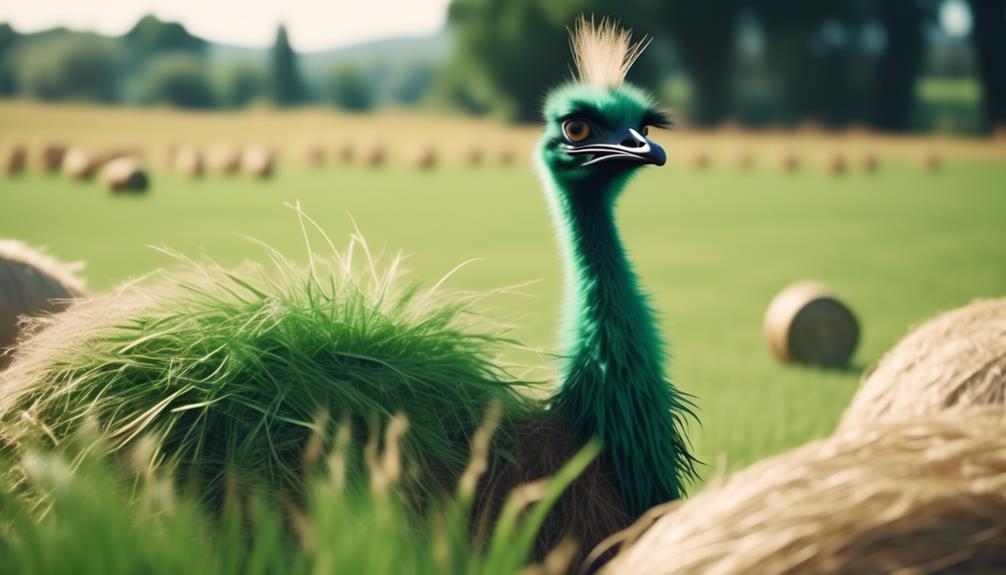
To ensure your emu receives the proper nutrition it needs, it's essential to carefully select the appropriate hay and grass for their diet. Emus are herbivores, and their diet primarily consists of grass and hay. When selecting hay for your emu, it's important to consider the quality. Look for hay that's fresh, green, and free from mold or dust. High-quality hay will provide your emu with essential nutrients and fiber.
In addition to hay, you may also consider incorporating grass into your emu's diet. Emus enjoy grazing on fresh grass, which provides them with additional nutrients and variety. However, it's important to ensure that the grass is free from pesticides or harmful chemicals.
If hay isn't readily available or if you're looking for hay alternatives, there are a few options to consider. Some emu owners have found success in feeding their birds fresh fruits and vegetables, such as lettuce, kale, and carrots. These can be offered as a supplement to their hay and grass diet.
Incorporating Fruits and Vegetables Into Emu Diets
When incorporating fruits and vegetables into your emu's diet, it's important to choose options that are safe and nutritious for them. Emus can benefit greatly from a varied diet that includes a mix of fruits and vegetables. Here are some options to consider:
- Leafy Greens: Emus enjoy a variety of leafy greens such as lettuce, spinach, and kale. These provide essential vitamins and minerals.
- Berries: Strawberries, blueberries, and raspberries can be a tasty treat for your emu. They're rich in antioxidants and provide a natural source of sweetness.
- Carrots: Carrots are a great source of beta-carotene, which is important for maintaining healthy eyesight in emus.
- Apples: Emus can enjoy apples as a snack. Just make sure to remove the seeds and core before giving it to them.
Incorporating fruits and vegetables into your emu's diet has several benefits. A varied diet ensures that your emu receives a wide range of nutrients, promoting overall health and well-being. Fruits and vegetables also provide hydration and fiber, which aids in digestion. Remember to introduce new foods gradually and monitor your emu's response to ensure they tolerate and enjoy their new additions.
Special Considerations for Breeding Emus
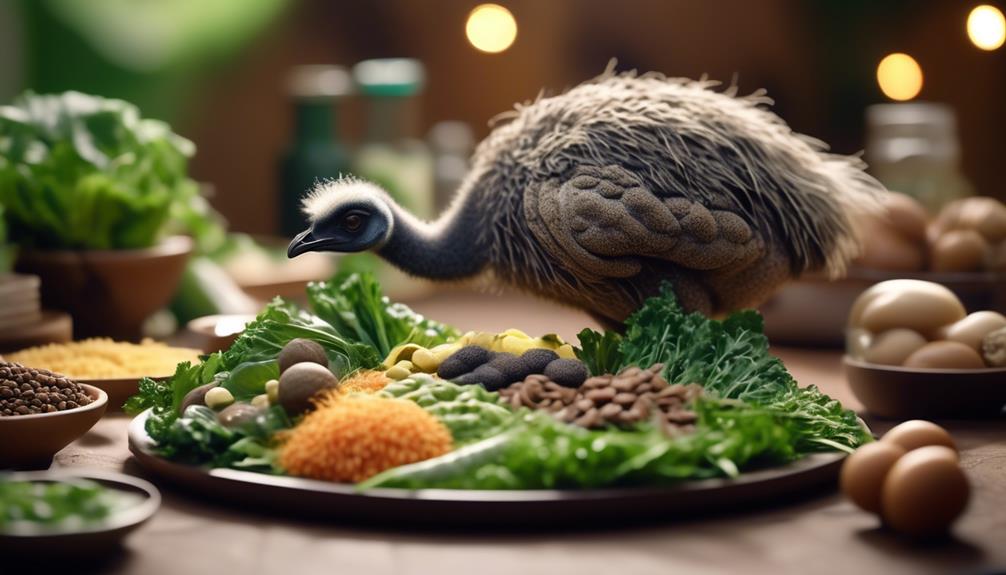
Breeding emus requires careful consideration and attention to specific factors to ensure successful reproduction and the health of both the male and female emus. There are several breeding challenges that emu breeders may face, such as low fertility rates and egg viability.
To overcome these challenges, optimizing the breeding diet is crucial. Breeding diet optimization plays a significant role in ensuring the reproductive success of emus. Research has shown that providing a balanced and nutrient-rich diet to breeding emus can increase fertility rates and improve egg quality. Emus should be fed a diet that's high in protein, vitamins, and minerals, as these nutrients are essential for reproductive health.
Supplementing the breeding diet with specific nutrients can also be beneficial. For instance, omega-3 fatty acids have been found to improve egg production and hatchability in emus. Including sources of omega-3 fatty acids, such as fish oil or flaxseed, in the breeding diet can help optimize reproductive outcomes.
It's important to note that individual emus may have unique dietary requirements, so consulting with a veterinarian or avian nutritionist is recommended. They can evaluate the specific needs of your breeding emus and provide tailored dietary recommendations.
Feeding Emu Chicks: A Guide for Success
Feeding emu chicks is a critical aspect of their early development and requires careful attention to their nutritional needs for optimal growth and health. To ensure proper growth, it's important to establish a routine feeding schedule that meets their specific requirements. Here's a guide to help you successfully feed your emu chicks:
- Provide a high-quality starter feed: Emu chicks need a balanced diet that's rich in protein, vitamins, and minerals. Look for a commercial emu chick starter feed that meets their nutritional needs.
- Offer fresh water at all times: Emu chicks need access to clean, fresh water at all times. Make sure to provide them with a shallow dish or waterer that's easily accessible.
- Introduce small amounts of greens and insects: As emu chicks grow, you can gradually introduce small amounts of greens, such as lettuce or spinach, and insects like mealworms. These will provide additional nutrients and help stimulate their natural foraging behavior.
- Monitor their growth and adjust feeding amounts: Keep a close eye on your emu chicks' growth and adjust their feeding amounts accordingly. Overfeeding can lead to health issues, while underfeeding can result in stunted growth. Consult with a veterinarian or experienced emu breeder for guidance.
Establishing a consistent feeding routine and providing a balanced diet will help ensure that your emu chicks grow up strong and healthy. Remember to consult with professionals and monitor their development closely to make any necessary adjustments along the way.
Recommended Supplements for Optimal Emu Health
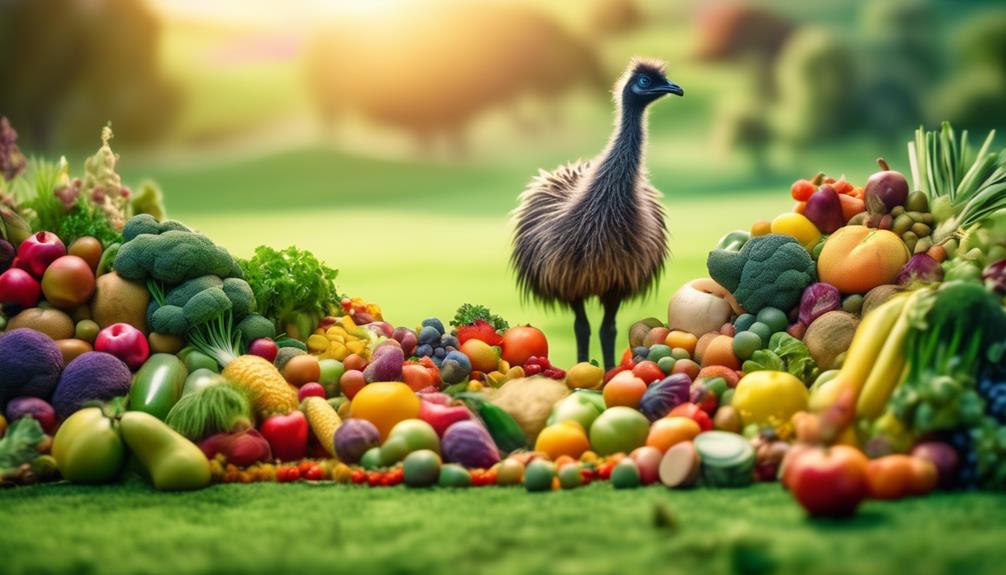
For optimal health, it's important to consider recommended supplements for your emu. While a balanced diet is crucial, supplements can provide additional support to ensure your emu's digestive health and manage their weight effectively.
One key supplement to consider is probiotics. These beneficial bacteria can help maintain a healthy gut flora in emus, aiding in digestion and nutrient absorption. Probiotics can also support the immune system, promoting overall well-being.
Another important supplement is omega-3 fatty acids. Emus, like humans, require a balance of omega-3 and omega-6 fatty acids for optimal health. Omega-3s have been shown to have anti-inflammatory properties and can help support heart health in emus.
Additionally, vitamins and minerals play a vital role in your emu's overall health. Vitamin E, for example, is important for muscle function and fertility, while zinc is crucial for immune system function and wound healing.
When choosing supplements, it's important to consult with a veterinarian or an avian nutritionist to ensure you're providing the right dosage and combination for your emu's specific needs. Remember, supplements should never replace a balanced diet but rather complement it to support optimal health.
Balancing the Emu Diet: Tips and Tricks
To ensure optimal health and well-being for your emu, it's essential to carefully balance their diet with a variety of nutrient-rich foods. By considering the specific needs of emus, you can create a well-rounded diet that promotes weight management and supports digestive health. Here are some tips and tricks to help you achieve this:
- Focus on high-quality proteins: Emus require a diet that's rich in protein to support their muscle development and overall growth. Include lean sources of protein such as insects, worms, and small vertebrates in their diet.
- Include a variety of fruits and vegetables: Emus benefit from the vitamins, minerals, and fiber found in fruits and vegetables. Offer a mix of colorful options like carrots, leafy greens, and berries to ensure a well-rounded diet.
- Provide ample water: Emus need access to clean and fresh water at all times. Water is crucial for proper digestion and hydration, so make sure to provide a constant supply.
- Limit high-fat foods: While some fat is necessary for emus, it's important to limit their intake of high-fat foods to prevent weight gain and potential health issues. Avoid feeding them excessive amounts of seeds or nuts.
Frequently Asked Questions
Can Emus Eat Meat or Animal By-Products?
Emus can eat meat or animal by-products, but it's important to consider the role of protein in their diet. A meat-based diet can impact an emu's health, so it's best to consult a nutritionist for advice.
What Are Some Common Signs of Nutrient Deficiencies in Emus?
If your emu is showing signs of nutrient deficiencies, such as weak feathers or poor growth, it's important to take preventive measures. Ensure a balanced diet with all necessary nutrients to keep your emu healthy.
Is It Necessary to Provide Supplements to Emus on a Regular Basis?
Supplementing emus: necessary or excessive? While the role of supplements in an emu's diet is debated, providing them on a regular basis can help ensure they receive all essential nutrients.
How Often Should Emus Be Fed Fruits and Vegetables?
You should feed your emus fruits and vegetables regularly. Aim for a balanced diet with recommended portion sizes to ensure their nutritional needs are met. It's important to provide variety and monitor their intake to promote their overall health and well-being.
Are There Any Specific Types of Hay or Grass That Should Be Avoided in an Emu's Diet?
You gotta watch out for certain types of hay and grass when feeding your emu. Some varieties can cause digestive issues and even be toxic. Make sure to keep them hydrated too!
Conclusion
Crafting the perfect diet for your emu is essential for their overall health and well-being. By understanding their nutritional requirements and providing essential nutrients, proteins, carbohydrates, and fats, you can support their optimal health.
Special considerations for breeding emus and feeding emu chicks are also important. To ensure their diet is well-balanced, recommended supplements can be added.
With these tips and tricks, you can create a nutritious and balanced diet that will keep your emus happy and thriving.




